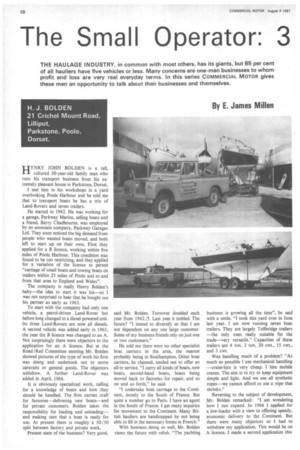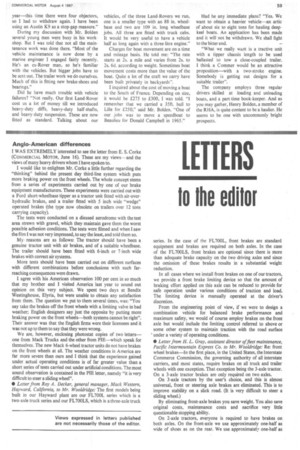The Small Operator: 3
Page 60

Page 61

If you've noticed an error in this article please click here to report it so we can fix it.
HENRY JOHN BOLDEN is a tall, cultured 30-year-old family man who runs his transport business from his extremely pleasant house in Parkstone, Dorset.
I met him in his workshops in a yard overlooking Poole Harbour and he told me that to transport boats he has a trio of Land-Rovers and seven trailers.
He started in 1962. He was working for a garage, Parkway Marine, selling boats and a friend, Barry Chadbourne, was employed by an associate company, Parkway Garages Ltd. They soon noticed the big demand from people who wanted boats moved, and both left to start up on their own. First they applied for a B licence, working within five miles of Poole Harbour. This condition was found to be too restricting, and they applied for a variation of the licence to permit "carriage of small boats and towing boats on trailers within 25 miles of Poole and to and from that area to England and Wales".
The company is really Henry Bolden's baby—the idea to start it was his—so I was not surprised to hear that he bought out his partner as early as 1963.
To start with the company had only one vehicle, a petrol-driven Land-Rover but before long changed to a diesel-powered unit. Its three Land-Rovers are now all diesels. A second vehicle was added early in 1965, the year the B licence was changed to an A. Not surprisingly there were objectors to the application for an A licence. But at the Road /Rail Committee meeting Mr. Bolden showed pictures of the type of work his firm was doing and undertook not to move caravans or general goods. The objectors withdrew. A further Land-Rover was added in April, 1966.
It is obviously specialized work, calling for a knowledge of boats and how they should be handled. The firm carries craft for factories—delivering new boats—and for private customers. Bolden takes the responsibility for loading and unloading— and making sure that a boat is ready for use. At present there is roughly a 50/50 split between factory and private work.
Present state of the business? Very good,
said Mr. Bolden. Turnover doubled each year from 1962/5. Last year it trebled. The future? "I intend to diversify so that I am not dependent on any one large customer. Some of my business friends rely on just one or two customers."
He told me there were no other specialist boat carriers in the area, the nearest probably being in Southampton. Other boat carriers, he claimed, tended not to offer an all-in Service. "I carry all kinds of boats, new boats, second-hand boats, boats being moved back to factories for repair, and so on and so forth," he said.
"I undertake boat carriage to the Continent, mostly to the South of France. But quite a number go to Paris. I have an agent in the South of France. I get many inquiries for movement to the Continent. Many British hauliers are handicapped by not being able to fill in the necessary forms in French."
With business doing so well, Mr. Bolden views the future with relish. "The yachting
business is growing all the time", he said with a smile. "I took this yard over in June last year. I am now running seven boat trailers. They are largely Tollbridge trailers —the only ones really suitable for the trade—very versatile." Capacities of these trailers are 4 ton, 2 ton, 30 cwt., 15 cwt., and 3 cwt.
Was handling much of a problem? "As much as possible I use mechanical handling —crane-hire is very cheap. I hire mobile cranes. The aim is to try to keep equipment simple and light. And we use all synthetic
ropes we cannot afford to use a rope that shrinks."
Reverting to the subject of development, Mr. Bolden remarked; "I am wondering how I can expand. In 1966 I applied for a low-loader with a view to offering speedy, economic delivery to the Continent. But there were many objectors so I had to withdraw my application. This would be on A licence. I made a second application this year—this time there were four objectors, so I had to withdraw again. I have been using an Austin K9 as a stop-gap measure."
During my discussion with Mr. Bolden several young men were busy in his workshop. But 1 was told that not all the maintenance work was done there. "Most of the vehicle maintenance is now done by a marine engineer I engaged fairly recently. He's an ex-Rover man, so he's familiar with the vehicles. But bigger jobs have to be sent out. The trailer work we do ourselves. Much of this is fitting new brake-shoes and bearings."
Did he have much trouble with vehicle failures? "Not really. Our first Land-Rover cost us a lot of money till we introduced heavy-duty diffs, heavy-duty half-shafts, and heavy-duty suspension. These are now fitted as standard. Talking about our
vehicles, of the three Land-Rovers we run, one is a smaller type with an 88 in. wheelbase and two are 109 in. long wheelbase jobs. All three are fitted with truck cabs. It would be very useful to have a vehicle half as long again with a three-litre engine.
Charges for boat movement are on a time and mileage basis. He told me: "The rate starts at 2s. a mile and varies from 2s. to 2s. 6d. according to weight. Sometimes boat movement costs more than the value of the boat. Quite a lot of the craft we carry have been built privately in backyards-.
I inquired about the cost of moving a boat to the South of France. Depending on size, it would be £275 to £.300, I was told. "I remember that we carried a 35ft. hull to Lille for £250," said Mr. Bolden. "One of our jobs was to move a speedboat to Beaulieu for Donald Campbell in 1965." Had he any immediate plans? "Yes. We want to obtain a heavier vehicle—an artic of about six to eight tons for hauling deepkeel boats. An application has been made and it will not be withdrawn. We shall fight to the bitter end.
"What we really want is a tractive unit with a tipper chassis length to be used ballasted to tow a close-coupled trailer. I think a Commer would be an attractive proposition—with a two-stroke engine. Somebody is getting out designs for a suitable trailer".
The company employs three regular drivers skilled at loading and unloading boats, and a part-time book-keeper. And as you may gather, Henry Bolden, a member of the RHA, is quite content to be a haulier. He seems to be one with uncommonly bright prospects.












































































































